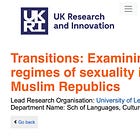10 examples of pointless international research - paid for by you, the taxpayer!
It sure is expensive funding research into "water justice" and "Intergenerational Healing" abroad
Recently I treated readers to examples of ghastly taxpayer-funded projects under Labour:
You may remember that several were very international in their remit, such as £903,433 for “Towards Indigenous Seed Data Sovereignty for Climate Resilience: Safeguarding Seed and Wild Plant Heritage in Jamaica and Trinidad and Tobago”.
In today’s article I will show you 10 examples of, in my view, pointless international research that we are paying for.
With Labour slashing international aid earlier this year, one could almost be convinced that the UK was clamping down on foreign spending.
But universities tell a completely different story (as well as the billions UK taxpayers are charged for migrant accommodation and open-border-promoting charities):
Here’s what else we’ve been paying for and the staggering sums involved. These are all ‘active’ (in other words, currently ongoing) projects:
£1,014,696 – Resettling the Colonial Lens: Photography and the (re)making of Malaysia’s New Villages
Photography was a key medium through which the British colonial state sought to document the Malayan Emergency (1948-60). This was particularly so for resettlement. Under this counterinsurgency scheme, almost half a million rural residents of colonial Malaya, most of them of Chinese ancestry, were forcibly moved into hundreds of resettlement camps – later re-labelled ‘New Villages’ (NVs) – in an attempt to undermine support for the Malayan Communist Party (MCP). However, resettlement in late-colonial Malaya has been largely overlooked in the now vast critical literature on the relationship between photography and colonialism. Concurrently, photography has been underemphasised in many ‘post-revisionist’ studies of the Malayan Emergency, even though the collection and reproduction of colonial-era images, and the emergence of new photographic practices, are key components of community-led re-assessments of resettlement in Malaysia today. ‘Resettling the Colonial Lens’ is a multidisciplinary and transnational project which aims to fill these gaps in the literature by asking the following core research question: what role has photography as a medium played in documenting, critiquing and re-writing the history of resettlement in late-colonial Malaya?





